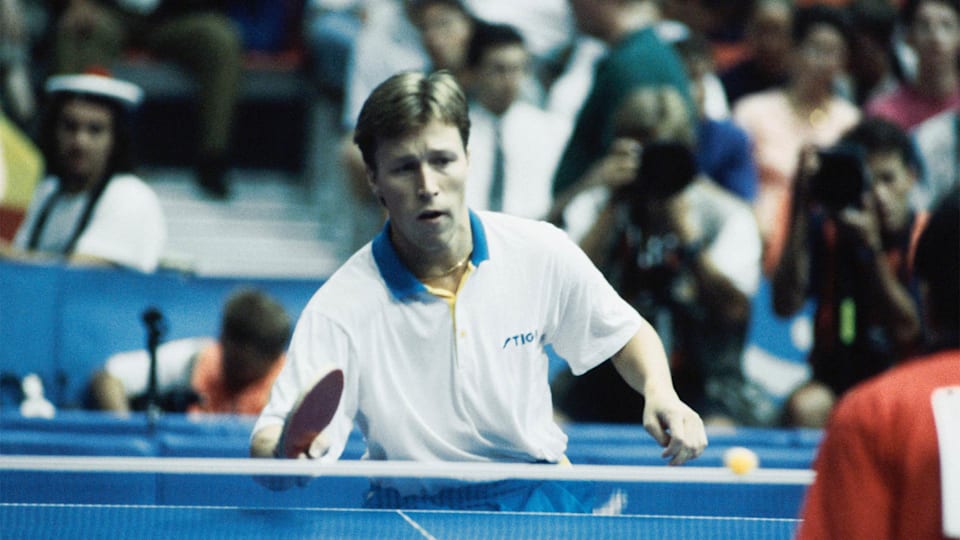Winning gold at Barcelona 1992 gave ‘Evergreen Tree’ Waldner ‘presidential’ fame
Jan-Ove Waldner, the legendary table tennis player, is a household name far beyond his native Sweden. His decades-long career now over, the Barcelona 1992 men’s singles champion is still a huge draw in China – and for Swedish multinationals...

Five Olympic Games and dozens of international medals have given table tennis ace Jan-Ove Waldner legendary status in his native Sweden. But the Barcelona 1992 gold medallist’s biggest following is still in the country of his toughest competitors: China.
“I’ve been having so much to do with them that they probably see me as half-Chinese,” Waldner, 53, said. “In 2000 (at the Sydney Games), when I beat the Chinese, there were 250 million viewers in China. So it gets quite big. You’d need a lot of European countries put together to reach those figures.”
Between 1983 and 2001, Waldner won 25 medals in world competitions. In China, that feat made him as famous as the president of the USA.
The Swedish table tennis club Kalmar BTK signed Waldner in 1995 – but only after officials had carried out a study to measure the player’s fame in China.
“Bill Clinton and I were the most famous Westerners in China, then (former basketball player) Michael Jordan or someone was on number three. So if you’ve been the biggest in China, it’s pretty huge there,” Waldner said.
“I’ve had a restaurant there, I’ve fought to get them the Olympic Games, I’ve become a stamp in China and I’ve played against six generations of Chinese players. I started my training in China, too. I went to Shanghai when I was 14 years old. After we had played the China Open we got to stay there and train for three weeks and I learned a lot from that training. So there’s a lot in my career that has to do with China.”
The Stockholm-born Olympic icon was only 16 when he reached the final at the 1982 European Championships, winning his first international medal at senior level. Ten years later, by then a multiple world champion, he won the singles competition at the Barcelona 1992 Olympic Games – possibly his most significant breakthrough.
“It was very special. We were there the first time in Seoul 1988 (when table tennis made its Olympic debut) and Erik Lindh (SWE) finished third. By then we didn’t really know how big it was,” Waldner said.
“But in 1992, you realised that. It was obviously very big, and I was the only one from Sweden winning a gold medal so it hit massively in Sweden. When you beat a foreigner in a final it’s different from when you play a Swede, so when I beat Jean-Philippe Gatien (FRA) it was pretty full-on. If you pick the three biggest individual competitions (of his career), Barcelona is up there. Then it’s my two single World Championship titles, especially the second one from Manchester 1997 when I won without losing a set. Although at the Olympics I only lost one set, so that’s pretty good, too.”
While his competitors retired, Waldner continued, earning the nickname ‘The Evergreen Tree’ in China. He played in the first five Olympic table tennis tournaments following the sport’s introduction to the Olympic programme, losing a close final at Sydney 2000. Waldner admits that Barcelona gets tough competition in terms of his best Games memories.
“2000 was very special. It was also huge because I lost 3-2 to Kong Linghui (CHN) in the final. And if you look at the whole, Sydney was perhaps the best Games in terms of arrangements. It was amazingly beautiful in Sydney,” Waldner said.
In his final Games, Athens 2004, Waldner caused the tournament’s biggest upset as he came straight from a long injury to reach the semi-finals at the age of 38.
“It’s obviously another great memory,” he said.
“In 2003 I’d been gone for about eight months with a foot injury and made a comeback the year after. And there were so many fans – I think that’s where I had the most fans. It was about five-six thousand Swedes at each match so that was very cool. There had been a lot of debating whether I should go or not so I think that when I did, there was a huge effect. And I was a little older, perhaps they liked that.”
Waldner thanks his Swedish origin for the possibility to have such a long international career.
“In China I wouldn’t have been able to play five Olympic Games as they can only send their best three players,” he said.
“In 2004 I would never have made it to the Chinese team. I would perhaps have been eighth or tenth there with my injury. But (seven-time Olympian) Jörgen Persson and I were still best in Sweden. And I had a favourable style of play, with good serves that could give me some easy points. But yes, I needed a lot of Voltaren (pain relief) at the end of my career.”
Having won the Swedish singles championship as late as 2010, Waldner played his final match in 2016, ending a career spanning four decades. However, ‘The Evergreen Tree’ continues to travel to the Eastern superpower, with Swedish companies queuing up for his help.
“I’m still a door-opener in China,” Waldner said.
“Every week that I come into the office to check my email, there are 20-30 emails from different companies wanting to do events with me. When Volvo are doing something, or Ikea open a new store there, I am usually there. So a lot of my life still revolves around table tennis.”
